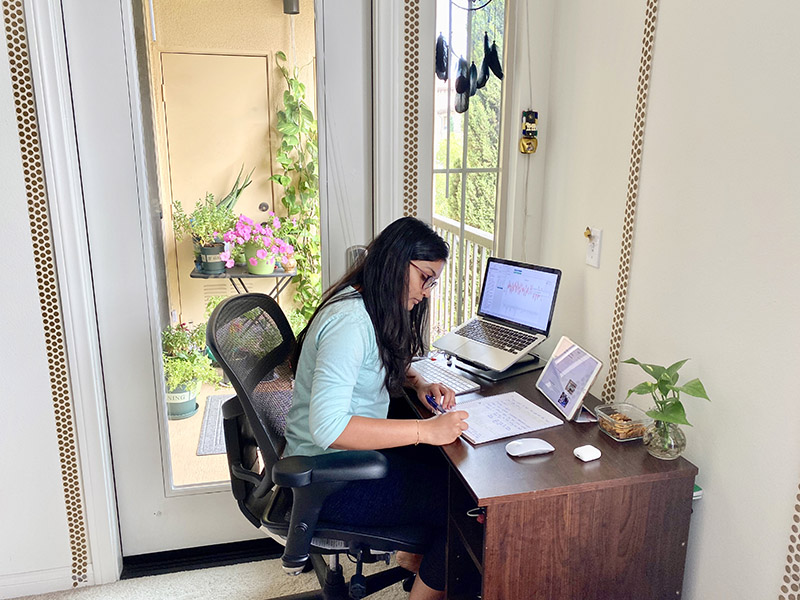‘Earn and learn’ initiative seeks to open doors, expand equity in computing.

Northeastern University, Middlesex Community College, and Bunker Hill Community College are launching the Associate to Master’s degree Pathway for Technology (A2M4Tech) program, an innovative and affordable pathway to the technology sector for learners who begin their undergraduate education in community college. The development and startup of the program are supported by a $750,000 grant from Akamai Technologies Inc.’s Akamai Foundation. Dubbed “earn and learn”, the program addresses institutional barriers that have long slowed progress in achieving equity in computer science, interleaving study and work by providing full-time employment opportunities for students while they pursue their degrees.
“The Akamai Foundation is pleased to fund the Pathway for Technology (A2M4Tech) to expand and diversify the tech talent pool and support Northeastern University’s commitment to experiential education,” says Kara DiGiacomo, Director of Corporate Philanthropy, Akamai Technologies.
“The A2M4Tech program is an accessible pathway to an in-demand field with high-paying jobs,” says Dr. Liz Zulick, Director of the Lowell Institute School and Associate Dean for Research, Innovation, Discovery and Entrepreneurship at Northeastern University College of Professional Studies. “Many of our students have to work full-time while attending classes and completing coursework. Consistent employment is a necessity and, ideally, we want that job to be in the student’s field of study. Thanks to this grant from the Akamai Foundation, we can now create a pathway that works for adult learners, allowing those who otherwise might not be able to afford the cost or time investment of a degree, to enter the tech sector. Importantly, this pathway also offers industry partners a talent pipeline that is diverse in terms of race, ethnicity, and income—something that is an increasingly high priority for many employers. So, this program is a true win-win.” A2M4Tech is modeled on a similar program developed by Northeastern and Middlesex in the biotech sector.
As the U.S. job market has shifted dramatically toward STEM fields over the past half-century, the share of jobs requiring postsecondary education has doubled. This poses a vexing challenge in an economy where, according to a study published by the National Bureau of Economic Research, fully half of individuals from high-income families have a bachelor’s degree by age 25, while just 10% of those from low-income families do. According to the Postsecondary Value Commission, students of color and students from low-income backgrounds are concentrated in for-profit institutions and two-year colleges—where they are more likely to leave in debt but without a degree. Because variations in attendance, completion, and post-college outcomes by race, ethnicity and income are especially divergent in STEM fields that offer some of the best job opportunities, the A2M4Tech program is specifically designed to support students from underrepresented populations looking to gain credentials in computer science.
“The technology field should be accessible for everyone,” says Carla Brodley, Executive Director of the Center for Inclusive Computing (CIC) at Northeastern. “Removing the barriers that contribute to exclusion in computing is an urgent priority, and the A2M4Tech program is an opportunity for industry partners to take a leading role in achieving that goal. I think Massachusetts is the perfect place to pilot this approach given the Mass Technology Leadership Council’s Tech Compact for Social Justice, which more than 90 Massachusetts companies signed in summer of 2020 when it launched. ”
“Middlesex is excited to expand our partnership with Northeastern to offer another rewarding and relevant pathway to STEM for our diverse population of learners,” said Kathleen Sweeney, MCC’s Dean of STEM. “As there are a number of high-quality STEM positions available across Massachusetts, access to education has never been more important. We are proud to not only be a starting point for so many students, but to be able to guide them on their paths to stable jobs and incomes, and brighter futures.”
The donation by the Akamai Foundation provides scholarships, wrap-around student support services, career coaching and mentorship, curricular updates, and financial support for day-to-day expenses such as textbooks and transportation. This allows Northeastern to leverage its 120+ year commitment to experiential education via its co-op program and focus on identifying industry partners that will provide the employment opportunities for the A2M4Tech students.
“Bunker Hill Community College is thrilled to partner with Northeastern University in our commitment to investing in our communities and advancing equity by providing quality education and connecting students to high-demand technology fields,” said Austin Gilliland, BHCC’s Dean of Professional Studies.
“The unequal rates of completion and entry into the tech industry that have prompted the creation of this program are by no means unique to Boston,” Zulick said. “Finding effective models that integrate learning and working, rather than just alternating the two, should be an urgent national priority. Given Akamai’s global footprint and overlap with Northeastern in locations such as San Jose, Vancouver, and London—we see a big opportunity to grow the impact.”
The first cohort of students in the A2M4Tech program will launch in fall of 2022, and Northeastern is currently recruiting industry hiring partners. Please reach out to Liz Zulick.